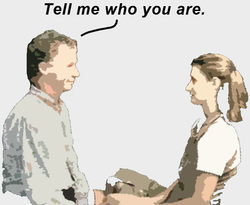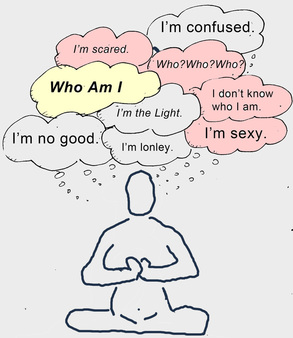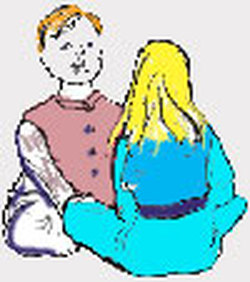 Teachers of spiritual liberation and enlightenment throughout the world and throughout the course of human history counsel that you are already enlightened. The difficulty is that though you KNOW who you are, you may not be conscious of it. There is a difference between knowing who you are and consciousness of who you are. It's similar to this example. At THIS moment, before I bring to your attention, your birthday or where your car is parked or what you had for breakfast, you are not conscious of that. Though you probably KNOW those things, that is, your birthday, where your car is parked and what you had for breakfast but you were not conscious of it. In a similar way you KNOW who you are but you are not conscious of it. Reflect on that for a moment or two and let it sink in.  When you participate in the Enlightenment Intensive your attention is systematically and consistently focused on bringing who you are into conscious direct knowing by your fellow participants regularly requesting that you reveal to them who you really are. It's quite profound and simple. It's the potency of the Biblical phrase, "Where two or more are gathered in my name".  As Charles Berner noted, it would be relatively easy to contemplate who you are "if you didn't have a mind." But it's precisely because you have a mind that it can be immensely difficult to bring your knowingness of who you are into consciousness because the mind gets in the way. What is this 'mind' that gets in the way I hear you asking. Berner explains that the mind is the place where all kinds of "ideas, experiences, feelings, traumas and memories" about yourself are stored". These stored ideas and impressions originate from those experiences in your life that you haven't fully understood. They arise from the psycho/social/cultural environment that you were raised in which socializes, conditions, trains and habituates you to think one way or the other about who you are and what life is. This brings about identifications with various personality traits. For example, the residue of various experiences get stuck in your sub conscious or conscious mind like that time when you were only four years old and your father startled you when he screamed at you or when that cute puppy dog bit you or that school teacher or priest touched you and made you feel strange. It's these sorts of experiences which are too intense for you to integrate or understand that become stored in your mind. Also stored in the mind are experiences like being told you are fat, short, ugly, smart, stupid or that life is a struggle or that you'll never be as good as your brother or sister. It may be experiences like growing up being told you are superior to others because of your religion, wealth, social status, skin colour, sexual orientation or family origins. These and countless other experiences are stored as impressions in the mind. These impressions fill you up with lots of things about who are that you haven't fully understood or that you haven't been able to get understood by other people. They fill you up with things that you think you are but aren't. When you contemplate who you are the mind will bring up all these ideas and impressions about who you are that you are identified with. And, as Berner says, there might be a lot of ideas about yourself that you have not understood which results in various degrees of confusion, uncertainty, un-clarity and emotional disturbance. "That's why," explains Berner "it takes years and years of solo contemplation to try to find one's way through the morass of the mind." Berner writes, "In the classical techniques of just contemplating, the aspirant gradually burned out the mind. If you stared at a rock long enough it would dissolve away. It would take staring for a long time, about four hundred billion years or so. Breathing on a rock would gradually wear it down a little faster by wind erosion. Running water would make it go a little faster. Taking a hammer out and smashing it or pouring chemicals on it might dissolve it away in minutes. So there are different rates at which you can dissolve away identifications, confusions, traumas, and vested interests that are contained in the mind that make the mind stick and hold on." If solo meditation or contemplation gradually burns out the mind is there a way to speed up the process of enlightenment, that is, of bringing consciousness to the activity of directly knowing who you are?  Yes, Berner explains, "the most powerful means to dissolve the mind is through communication…" At the Enlightenment Intensive this principle of dissolving the mind through communication between individuals is taken full advantage of. When you contemplate who you are and then communicate what you become conscious of to another the process of enlightenment is accelerates. This is the power of the Enlightenment Intensive and the Enlightenment Technique. As Berner says, "When the things in the mind are communicated, they dissolve and vanish out of the mind to the degree that they are received and understood by another individual." For More Information check out these publications:
Enlightenment and the Enlightenment Intensive (Volume 1), by Charles Berner; edited and compiled by Yoah Wexler, PhD http://www.amazon.com/dp/1492267546 Enlightenment and the Enlightenment Intensive (Volume 2) by Charles Berner; edited and compiled by Yoah Wexler, PhD http://www.amazon.com/dp/1492263281 Relating and Spiritual Consciousness: Communication, Love and Relating Dyads by Charles Berner; edited and compiled by Yoah Wexler, PhD http://www.amazon.com/dp/1518696287 Knowing Your Self: 100 Self Awareness Exercises by Yoah Wexler, PhD http://www.amazon.com/dp/1490339434
0 Comments
|
Archives
December 2023
|
 RSS Feed
RSS Feed